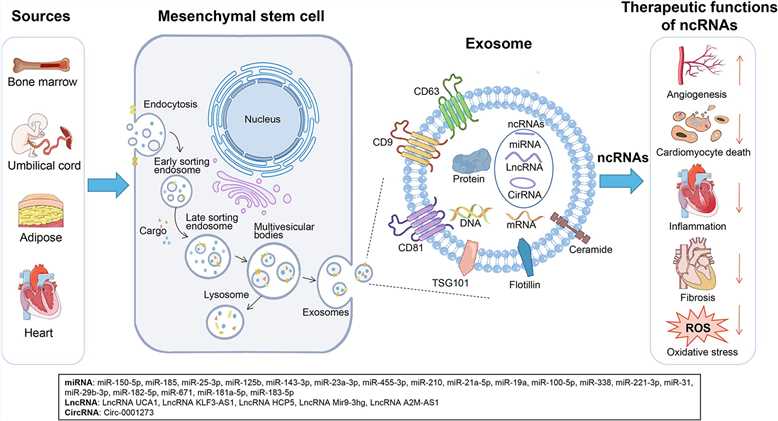Cardiac Cell Function
Exosomes have shown to serve as an effective tool for drugs delivery in the treatment of cardiac diseases. Moreover, they also have shown to enhance cardiac regeneration after myocardial infarction (MI). With the extensive experience in the field of exosome research, Creative Biolabs is confident to provide a full range of exosome-related services for global customers.
Roles of Exosomes in Cardiac Cell Function
The most important role of exosome is cell-cell communication by carrying nucleic acids, proteins and lipids, thereby participating in the behaviour of various cells. It has reported that exosome-derived molecules have an effect on cardiac function and involved in progression of diverse cardiovascular diseases (CVDs), such as myocardial infarction, cardiomyopathy. Cardiac hypertrophy is one of the major changes in cardiac structure caused by hypertrophic signals delevered via exosmal miRNAs from various kinds of cells to cardiomyocytes. Exosomes generated from cardiac fibroblasts can also promote cardiomyocyte hypertrophy via stimulating angiotensin II production. In the mouse model of MI, the exosomal miRNA-133a levels in infarcted and peri-infarcted myocardium were significantly reduced, accompanied by myocardial cell death. By releasing cardioprotective HSP70 and other protective signals, exosomes obtained from healthy controls had a cardioprotective action on ischaemic myocardium from patients with coronary artery disease.
Exosome Applications in Cardiac Diseases Therapy
Regarding the essential role of exsomes in cardiac cell function, more and more attention has been paid to the application of exosomes in cardiac disease therapy. One important advantage of exosome in therapeutic application is that exosome can be modified as an effective delivery tool for transferring bioactive molecules to specific cells. Therapeutic miRNA loaded into exosomes can be delivered to recipient tissues, displaying cardioprotective and anti-inflammatory effect, and are potential to reduce atheromatous plaque formation. Proteins such as Hsp70 that can be engineered into exosomes and subsequently to further support target delivery to specific cells and tissues and function therapeutic effect such as attenuating myocardial reperfusion injury.
Interestingly, mesenchymal stem cells (MSCs)-derived exosomes are able to enhance the viability of cardiomyocytes after ischaemia/reperfusion injury. This suggests that MSC-derived exosomes have the beneficial effects in the recovery of functional myocardium, representing a promising cell-free therapeutic option for myocardial repair. Furthermore, studies have also indicated that stem cell-derived exosomes have a cardioprotective effect and participate in the cardiac regenerative process after MI and ischemia/reperfusion injury.
 Fig.1 Biogenesis of mesenchymal stem cell-derived exosomes and potentially therapeutic functions of non-coding RNAs they carry.1,2
Fig.1 Biogenesis of mesenchymal stem cell-derived exosomes and potentially therapeutic functions of non-coding RNAs they carry.1,2
Creative Biolabs successfully offers the high-quality Exosome Engineering Services to help customers to load their interested drugs, proteins and nucleic acids into exosomes and to observe their role in disease treatment. In addition, we also provide other services related to exosomes such as Isolation, Purification, Exosome Characterization, Quantification, Profiling, etc. We provide high quality services to promote the development of your project.
If you are interested in services, please feel free to contact us for more details.
References
-
Liu, Y.; et al. Advances in the study of exosomes derived from mesenchymal stem cells and cardiac cells for the treatment of myocardial infarction. Cell Communication and Signaling. 2023, 21(1):202.
-
under Open Access license CC BY 4.0, without modification.
For Research Use Only. Cannot be used by patients.
Related Services:

 Fig.1 Biogenesis of mesenchymal stem cell-derived exosomes and potentially therapeutic functions of non-coding RNAs they carry.1,2
Fig.1 Biogenesis of mesenchymal stem cell-derived exosomes and potentially therapeutic functions of non-coding RNAs they carry.1,2









